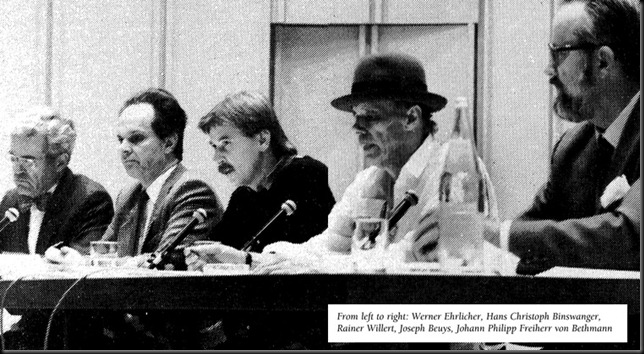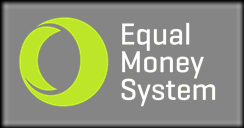“People increasingly see that money today is a commodity, in other words, an economic value – I’m trying to say something tangible about money here – that it is an economic value and that we have to reach a stage where it must become a necessary potential, must act as a rights document for all the creative processes of human work
Both sectors, production as well as consumption, must be regulated by democracy, which itself has to relate to money. If democracy is not related to money, all the people’s democratic efforts will be destroyed by the power money can assume. So unless money has become a full rights document in which the production sector and the consumption sector are embedded in our society, it will continue to ensure the decline of human creativity, of the human soul, of the power of human creation, and the life of nature!
“And How money will work in the future – is that every individual becomes a participant by developing awareness of his own sovereignty and by promoting right concepts about just laws of the economy which have to prevail in future. This is where I very clearly state that every human being is an artist creating new social forms. If every person is an artist in this realm of social sculpture, it follows naturally […] But then it’s true that we must consider the individual’s aptitude, shall we say, with which he or she creates.
We should discuss only the potential of each human being to shape social forms, to shape the future, to create the new social organism.
How can all the planet’s inhabitants cooperate economically for the benefit of all, without an iron curtain, without borders, without weapons of the destruction of natural resources?
The undisputed axioms boil down to the fact that people know things have to be resolved democratically and that human beings must be perceived and viewed as free beings, bearers of the impulse for freedom. People have to understand the role of freedom and democracy, meaning, how freedom and democracy work together. This is the vantage point where they can see how the economies of capitalism and communism both fail. Yes, this is where they can develop such knowledge and act on it.
In doing so, people will have to develop imaginative concepts of the future shape of society – in the same way that the sculptor naturally has an imaginative concept of the shape of his sculpture. Their knowledge will organize itself in their consciousness and they will realize that money represents only one of the problems, though maybe one of the key problems of future social systems. […] Marx said it clearly, and in this Marx was right! How do people expect to achieve all these things which a sense of freedom tells them are desirable, self-determination at work, equal right and solidarity in the economy, in other words, a non-profiteering economy which works for the benefit of people and nature?
How do people expect to get to this level of awareness unless, shall we say, they engage with this social form and experience how, very similar it is to the form of the human being?
In other words, the power of money which prevents people from unfolding their capacities and realizing their aims has to end; the power of money has to be broken. But this doesn’t mean that money should be abolished; it is the meaning of money as an economic commodity which has to be abolished. […] Now that it is a commodity, we have to break this character and transpose it into a democratic totality. Because money, in its essential nature – and here we are concerned with insight into the whole of society – is a document of rights.
‘Geld’ [Money] comes from ‘Gold’, same etymology. But it comes equally from ‘Geltung’ (Validity), meaning the value people fix based on their perception of a natural right.
So, people’s creativity is, shall we say, rewarded with a bit of merchandise and by something which should no longer exist in the economy” The result is of course the polarity between capital and labour […] (People) now want self determination at work, so that we may finally consider the monetary system’s next metamorphosis into an economy of creative capacities!
Money, still harmful now in the economy because it is possible to buy it and to speculate with it, and because of the polarization between employers and employees, must lose this status and shift into what it is essentially today in people’s consciousness as a regulator of rights for all creative processes. In other words, overall, money has to express rights and duties. I say duties very consciously , because many people imagine that with the evolution of society we only have rights left! No, on the contrary: we have both. With the acquisition of new rights for everyone in the realms of work, new obligations also appear.
Considering that an illness generally precedes a death, at least we can say money is sick! And for it to be healthy again, we need new terms for this monetary system, and new forms.
If I look for the objective nature of money, I conclude today that the illness is rooted in the fact money is still an economic value in the economy, and that sick money will only be cured if money is recognized as a document of rights […] Money has to undergo a metamorphosis again, it has to relinquish its role in the market economy and engage in an economy of capacities. Then we would be concerned with human creative productivity. And we would come full circle, since each human being can then act within his company as co-creator of the future, can – in full dignity – contribute to shaping this future.
Wage dependency, private ownership of the mans of production, and profit as the driving force! These concepts are responsible for making the whole society sick and pushing humanity down into an abyss.
I myself support the idea that money should be a mandate – but more completely! – a document of rights […] At the beginning I spoke of the axioms for the future of our society. In and of themselves, they are irrevocably established! They are non-negotiable: equality and freedom. Both.
People today are essentially selfish. But at the next phase of our social will, potentially innate in all of us – if let’s just say we thin of ourselves as Christians – we will act to promote better human community.
I don’t support a planning apparatus in the old Soviet style but of enterprises in their free creative form. We don’t have them. We only have private economy enterprises and state enterprises. Neither of these principles works.
The right form – which could make the sick forest a task and field of activity for people – would be a foundation system […] The foundation by its very nature, is a public benefit economic system. And I imagine the form of the foundation to be the appropriate form for the whole social organism, for its production and its consumption. “
Joseph Beuys
Beuys, Joseph., Rosch, Ulrich et al What is Money? – A Discussion with J. Philipp von Bethmann, H. Binswanger, W. Ehrlicher, and R. Willert. 2nd Edition. Clairview Books, 2010. Print.
Visit:


Pingback: 335. Money in Equal Money Capitalism | MarlenLife's Blog